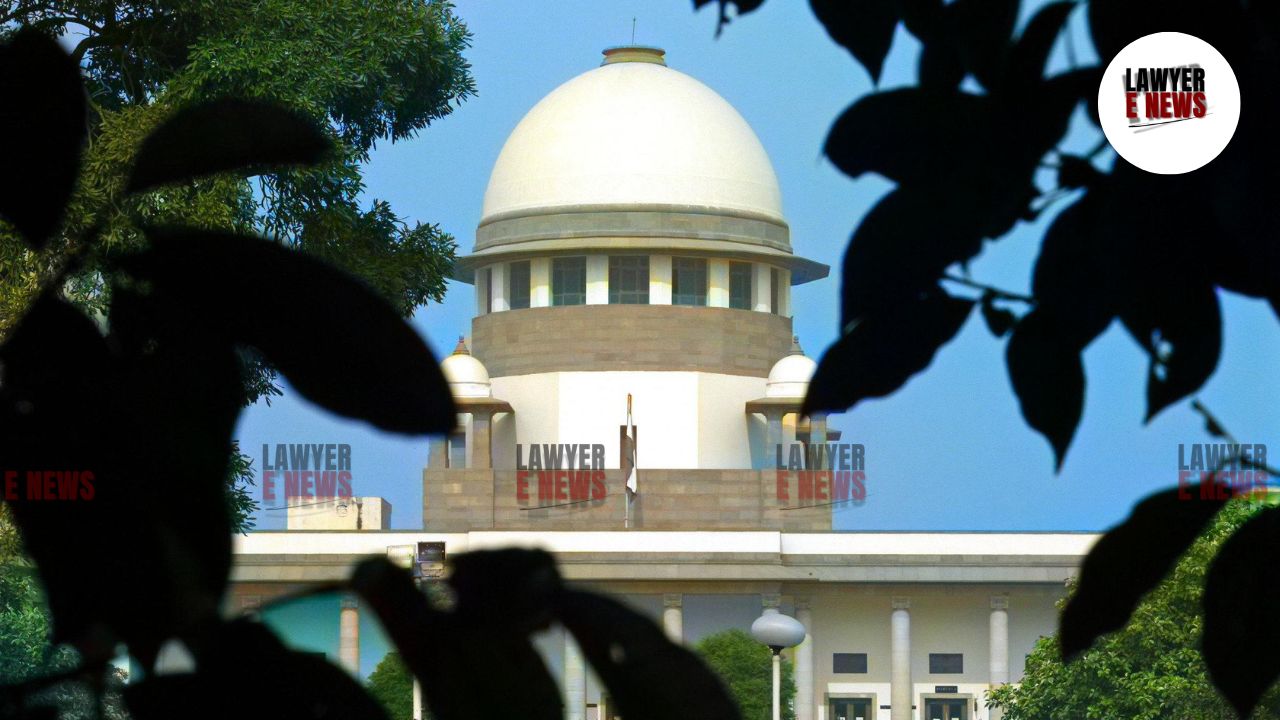-
by Admin
16 February 2026 1:47 PM



Award of Interest Must Balance Equity And Loss of Use of Money — Supreme Court settled a long-pending commercial dispute concerning interest on the enhanced valuation of shares transferred to the State of Rajasthan in 1973. The Court modified the Calcutta High Court's decision and directed payment of simple interest at 6% per annum from 08.07.1975 till the date of the decree and 9% per annum from the date of decree till realization. The Court held, "Though it is not possible to arrive at the actual value of improvement or the inflation on the fair consideration, if paid at the relevant point of time, it is just and necessary that the rate of interest must be a reparation for the appellant."
The case finds its origin in a transaction where the appellants sold their shares in Rajasthan State Mines and Minerals Ltd. (formerly Bikaner Gypsums Ltd.) to the State of Rajasthan in 1973. Dissatisfied with the valuation, the appellants instituted a suit in 1978 seeking a fair price for their shares. After multiple rounds of litigation, a preliminary decree was passed in 2012 directing a fresh valuation, leading to the valuation of Rs. 640 per share by M/s. Ray & Ray.
The valuation was contested by the State, but the High Court reaffirmed it while restricting interest to 5% simple interest in view of the prolonged pendency and the State's financial burden. Dissatisfied, the appellants approached the Supreme Court, limiting their grievance only to the rate of interest.
The key issue was whether the transaction qualifies as a "commercial transaction" under Section 34 of the Code of Civil Procedure, 1908 (CPC), thereby justifying interest beyond the statutory ceiling of 6%, and if so, what should be the appropriate interest rate.
The appellants argued that “interest is not a windfall, but compensation for the time value of money wrongfully withheld,” invoking precedents like Union of India v. Tata Chemicals Ltd. and Alok Shanker Pandey v. Union of India. They sought interest up to 15% with monthly rests, contending that they had been deprived of the money's productive use for over five decades.
The State, on the other hand, maintained that “the transaction was not commercial but an exercise of public interest to revive a loss-making entity,” denying any obligation to pay interest beyond 5%, and emphasizing that the appellants were being adequately compensated at Rs. 640 per share against their initial claim of Rs. 70.50.
Recognizing that the transaction was indeed commercial in nature, the Court rejected the State's plea, holding: "Here, it cannot be disputed that there has been a transaction of trade, viz. sale and purchase of goods, which clearly implies a commercial transaction between the parties."
However, the Court was equally cautious not to grant interest mechanically at exorbitant rates. It observed: "While the discretion to award interest, whether pendente lite or post-decree, is well recognized, its exercise must be guided by equitable considerations."
The Court also pointed out that while the appellants suffered immense delay, awarding interest at rates like 15% or 18% with monthly or quarterly rests, as claimed by the appellants, would be excessive and inconsistent with the spirit of Section 34 CPC: "Their claim of interest at 18% with quarterly rest or 15% with monthly rest, in the opinion of this Court, is unreasonable and cannot be accepted as such quarterly or monthly rest is beyond the scope of Section 34."
Further, invoking Clariant International Ltd. v. SEBI and Tomorrowland Ltd. v. HUDCO, the Court emphasized that in absence of a contractual stipulation for compound interest, only simple interest could be awarded.
The Court applied the doctrine of balancing equities: "The Court must ensure that while the claimant is fairly compensated, the award does not become punitive or unduly burdensome on the Judgment Debtor."
The Supreme Court, therefore, awarded interest as follows: "Simple interest at the rate of 6% per annum from 8th July 1975, on the enhanced valuation of shares till the date of decree and interest at the rate of 9% per annum from the date of decree till the date of realisation."
The Court gave the State two months to comply, failing which interest liability would continue.
The Court also made vital observations regarding the role of public bodies in commercial dealings: "The State and its instrumentality are parties to the contract with better bargaining or imposing authority... Further, with the price fixed found to be unconscionable, this Court affirmed the enhanced price fixed by the High Court."
The Court also quoted the principle laid down in Central Inland Water Transport Corp. Ltd. v. Brojo Nath Ganguly: "The courts will not enforce and will, when called upon to do so, strike down an unfair and unreasonable contract, or an unfair and unreasonable clause in a contract, entered into between parties who are not equal in bargaining power."
The Supreme Court thus balanced the legitimate expectation of the appellants for compensation with the financial burden upon the State. While recognizing that the appellants had been deprived of their dues for 50 years, the Court found their demand for compound or excessively high interest unjustified.
The appeal was partly allowed, modifying the interest awarded by the High Court but refusing to accede to the appellant's demand for compounded interest or punitive rates.
Date of Decision: April 1, 2025
